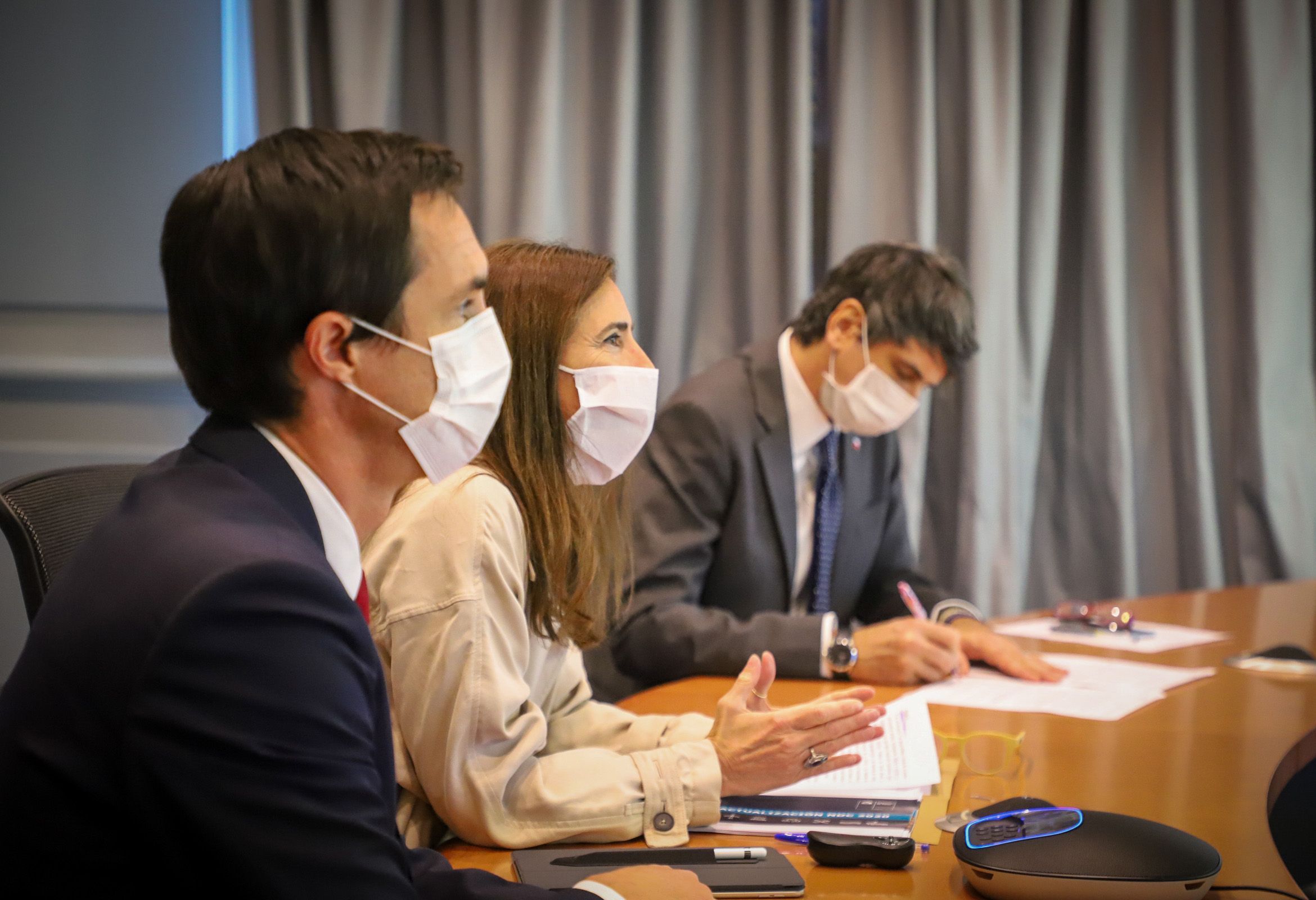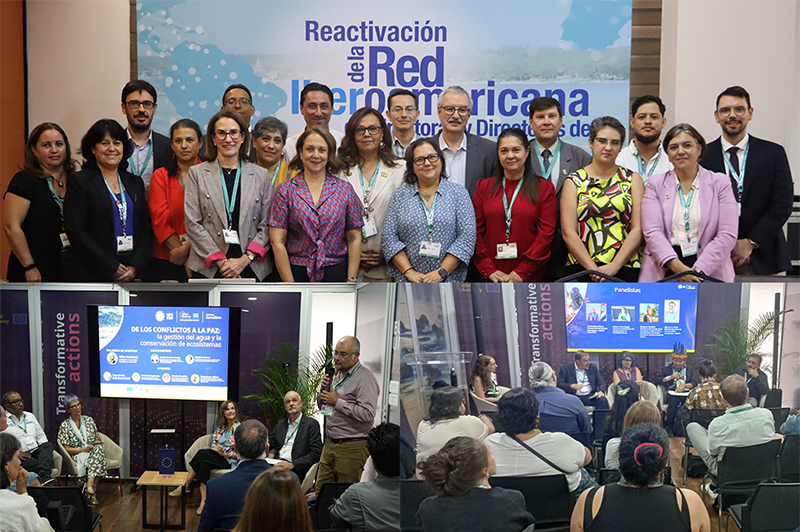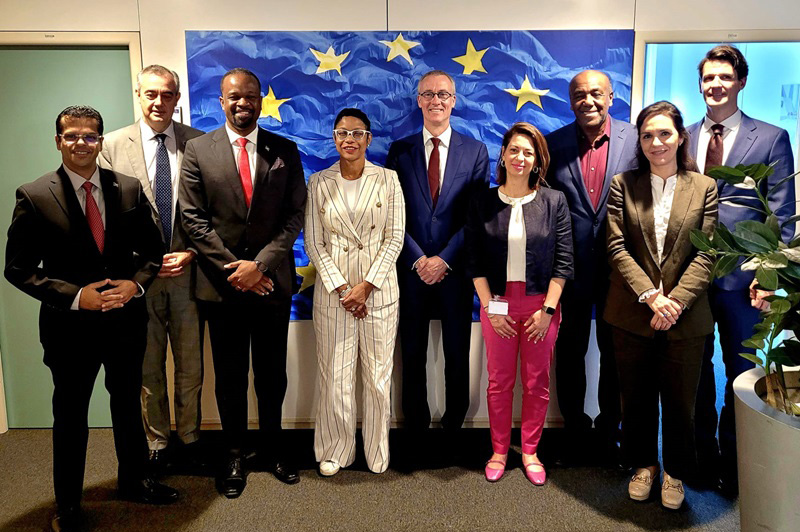Chile's Nationally Determined Contribution was developed after a broad participatory process, supported by the EUROCLIMA+ programme and other international cooperation initiatives, as well as various global climate action actors.
Santiago de Chile, April 15, 2020. The year 2020 has great relevance for climate action, since the first cycle of Nationally Determined Contributions (NDC) is being completed, and it is up to the different countries to update their climate commitments, with a view toward complying with the Paris Agreement.
Under this framework, and through a virtual session held on April 9, the Minister of the Environment of Chile and current President of COP25, Carolina Schmidt, accompanied by the ministers of Energy and Science and Technology Juan Carlos Jobet and Andrés Couve respectively, presented the new NDC of this Latin American country, putting itself at the forefront by being one of the first in the region and the world to publish an update of its climate goals and policies.
The call for increased climate ambition made in 2019 by UN Secretary General António Guterres and Chile itself in its role as COP25 President, is exemplified in the new NDC presented by the country. In the words of Minister Schmidt, "the new NDC establishes ambitious goals and commitments that will allow us to move forward at a steady pace in the transformation to a low-emission, climate-resilient economy, with great social, environmental and economic advantages for improving people's quality of life. This will be particularly relevant when the current crisis the world is experiencing due to the coronavirus pandemic is overcome, and recovery plans are reactivated in the country".
In her presentation, Minister Schmidt highlighted the importance that multilateralism has had in this process and thanked the support received from international cooperation for the updating of the country's NDC, recognising among these the contribution received from the European Union and the EUROCLIMA+ Programme.
The support to Chile for the updating of its NDC carried out by EUROCLIMA+ is part of its line of Climate Governance, and it is a reflection of the work that the European Union continually carries out for multilateral collaboration, particularly with Latin America to advance the intensification of the efforts to develop policies consistent with the challenges imposed by the climate crisis.
In this regard, the European Union Ambassador to Chile, Ms. Stella Zervoudaki, referred to this milestone, stating: “The fight against climate change requires great ambition and significant commitment. By COP26 in Glasgow, all country parties will have to have updated their NDCs and present long-term strategies as collectively agreed in Paris. Chile's updating of its NDC is a source of pride for the country and of satisfaction for the European Union, which has been working closely with the country for many years through the EUROCLIMA+ programme, cooperation which we have strengthened through our support to the Chilean Presidency of COP25. Chile and the EU will continue to cooperate in earnest to make these challenges a reality. We congratulate Chile on its ambitious plan.
Broader commitments, more ambitious goals.
In presenting the update of Chile's NDC, Minister Carolina Schmidt said, "the new NDC sets ambitious goals in four pillars: mitigation, adaptation, integration and, for the first time, a social pillar that permeates the other three to channel our economy and development towards low-emissions and climate resiliency, with a focus on the impact on people’s lives in their territories and in line with the 2030 Agenda for sustainable development.
For each of the pillars - mitigation, adaptation, integration and social, as well as the means of implementation (capacity building, technology transfer and financing)-, Chile's NDC proposes a series of specific objectives and targets.
One of the most important targets established by Chile is the commitment to a budget for greenhouse gas (GHG) emissions that will not exceed 1,100 MtCO2eq between 2020 and 2030, with a maximum of GHG emissions (peak) by 2025, and to reach a level of GHG emissions of 95 MtCO2eq by 2030. In addition, it proposes a reduction of at least 25% of total black carbon emissions by 2030, compared to 2016.
In addition to the above, Chile's new NDC incorporates targets and commitments that address issues not previously included, such as strategic plans for watershed and water resource management; ocean conservation and stewardship; protection of coastal wetlands and peatlands; landscape restoration, among others.
The Chilean document also highlights the incorporation of the Katowice rulebook, which, although it doesn’t enter into force until 2025, was included in advance by the authorities of this country in order to provide greater transparency and clarity in the implementation of the country's commitments.
Patricia Espinosa, the UNFCCC Executive Secretary who also participated in the event, highlighted in her speech the new Chilean NDC, stating that "this is extraordinarily important, especially for other countries that are engaged in the exercise of reviewing their plans. I am sure it will be very useful as an example for others [...] the announcement made by Chile today is a ray of light and hope because this is a day of ambition and responsibility, it is a day in which commitments have been met and they are leading by example".
A participatory process
In addition to the presentation of the new targets and commitments, the session also highlighted the mechanism for formulating the NDC, which was the result of a participatory process involving various actors from public, private, civil society and academic sectors, who contributed to the construction of the new targets and commitments that the country assumed through the document. As Chile's Minister of Science, Andrés Couve, pointed out, “For the first time the national scientific community participated actively in contributing evidence to the updating of the NDC. This participation materialised through the COP25 Scientific Committee, organised by MinCiencia, where more than 600 national scientists organised in seven working groups contributed evidence that helped contextualise what it means to incorporate the carbon budget into the Chilean reality and, together with this, to clearly establish a goal and a peak year in terms of Greenhouse Gas emissions. In addition, there were contributions from the scientific community in the areas of oceans, adaptation, biodiversity and for the development of a Strategy for Development and Technology Transfer for Climate Change”. The full report of the Scientific Committee is available here.
But, as pointed out by Carolina Urmeneta, head of the climate change office of the Chilean Ministry of Environment and focal point for EUROCLIMA+, this process not only counted on the participation of local actors, but also on the support and accompaniment of EUROCLIMA+ and other Programmes and Institutions of international cooperation for its development. In this way, and in the words of Urmeneta, “the support of EUROCLIMA+ in the development of participatory processes in the country, and the regional exchanges have been key to building this update in a cross-cutting manner with strong participation. We were willing to listen to each other, talk and make changes in order to have an Updated NDC that allows us to work on a road map and specific projects to meet the established goals”.
At the end of the activity, a discussion panel was held, with the participation of Gonzalo Muñoz, High Level Champion of COP25; Sara Larraín, Director of the NGO Chile Sustentable; Ricardo Bosshard, Director of WWF Chile; Claudio Seebach, Executive President of the Association of Generators of Chile; Maisa Rojas, Director of the Centre for Science and Resilience (CR2), and Mónica Araya, Transport Leader, Climate Champions and founder of the organisation Costa Rica Limpia.
Chile’s complete NDC document is available here, you can review the presentation made by the country on April 9 at this link




